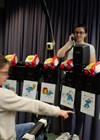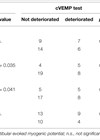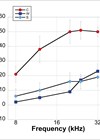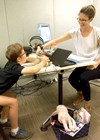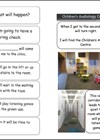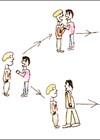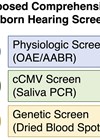Audiology features
Cochlear implantation in children with congenital single-sided deafness
To date, there has been very limited data supporting the effectiveness of early provision of a cochlear implant to the deaf ear in infants with congenital single-sided deafness. In this article, the authors share their pioneering work with this special...
Vestibular dysfunction after cochlear implantation in children
Whilst vestibular dysfunction is a known outcome of cochlear implant surgery, do we know the risk factors associated with this, particularly in children? In this article a team from University of Tokyo discuss their findings. Cochlear implantation (CI) is an...
Rapid genetic testing to avoid hearing loss in neonates
Thousands of newborn babies could avoid a lifetime of hearing loss thanks to a new rapid genetic test. In this article, we learn how. We have demonstrated for the first time that a rapid genetic test from a cheek swab...
COOL therapy for cisplatin-induced hearing loss
Cisplatin is a commonly used cancer therapy, with nearly 50% of patients undergoing chemotherapy receiving cisplatin as part of their regimen [1]. Depending on the dose, incidence of hearing loss has been reported as 12-100% in adults, and 37-94% in...
Decreased sound tolerance in autism: understanding and distinguishing between hyperacusis, misophonia, and phonophobia
Decreased sound tolerance (DST) affects a significant proportion of autistic people throughout their lifetime and, as Zachary J Williams explains, it is important that clinicians are aware of the three distinct subtypes of DST when making a diagnosis. Autism spectrum...
Audiological management of autistic children
Philippa James and Lucy Shiels explain the development of the ‘Autism Listening Clinics’, highlighting a recommended clinical approach for audiologists, the importance of remote microphone technology and sharing some wonderful caregiver experiences. Auditory challenges in autistic children Autism spectrum disorder...
Audiological testing strategies for children and young people with ASD
In 2014 the Hummingbird Clinic was opened, offering a bespoke clinic for children with complex needs or autism. In this article Keiran Joseph shares the wealth of knowledge gained in this clinic over the years and offers some top tips...
Listening differences in autistic individuals
In this article Erin Schafer, Lauren Mathews and Andrea Dunn outline the common auditory issues that autistic individuals face in comparison with their neurotypical peers and highlight the need to move beyond the traditional audiologic test battery when working with...
How can we understand autism and autistic children better?
Andrew Whitehouse draws on his years of experience working with neurodiverse people to give a fantastic insight into the world of autism, as well as suggesting some simple strategies clinicians can use to improve communication with autistic people. How can...
Genetics and the newborn hearing screen: the future is now
Eliot Shearer shares the progress being made with newborn hearing screening 60 years on from where it started, and future directions for identifying hearing loss using physiologic, genetic and cCMV screening. Newborn screening had its birth in the early 1960s,...
100,000 Genomes Project: in conversation with Tess Lopez
For Jul/Aug 2021, ENT & Audiology News features several contributions from the 100,000 Genomes Project, and Tess Lopez very kindly agreed to talk to me about her involvement with the project, as well as sharing her personal experiences of having...
Promoting human rights of deaf communities in low-resource settings
Stigma and misconceptions about deafness are serious impediments for many deaf people to realise rights and potential in some of the most challenging situations globally. Around 430 million people are estimated to live with moderate or higher levels of hearing...


